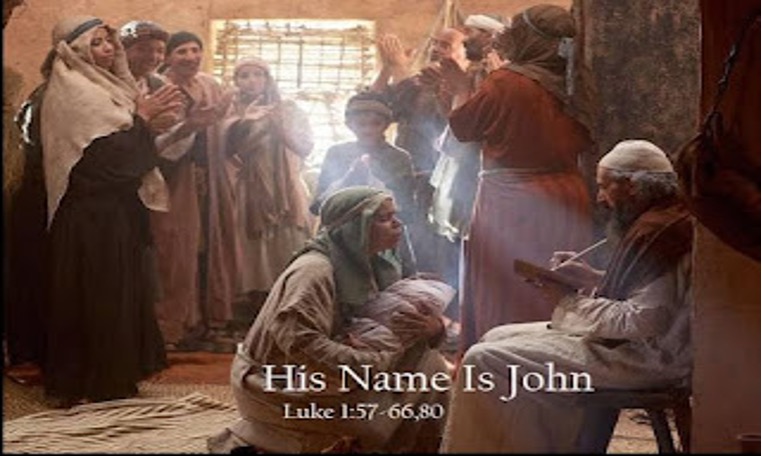
Gospel
When the time arrived for Elizabeth to have her child
Lk 1:57-66
she gave birth to a son.
Her neighbors and relatives heard
that the Lord had shown his great mercy toward her,
and they rejoiced with her.
When they came on the eighth day to circumcise the child,
they were going to call him Zechariah after his father,
but his mother said in reply,
“No. He will be called John.”
But they answered her,
“There is no one among your relatives who has this name.”
So they made signs, asking his father what he wished him to be called.
He asked for a tablet and wrote, “John is his name,”
and all were amazed.
Immediately his mouth was opened, his tongue freed,
and he spoke blessing God.
Then fear came upon all their neighbors,
and all these matters were discussed
throughout the hill country of Judea.
All who heard these things took them to heart, saying,
“What, then, will this child be?
For surely the hand of the Lord was with him.”
Reflection
The Gospel of Luke 1: 57-66 reminds us of the need for and power of self-reflection throughout our lives, a practice that is principally crucial during Advent. As we approach the coming of Christ, it is evident that we must be awake to our thoughts, to our expectations, to our beliefs, our faith and to our overall intuition. During Advent, it is particularly important to develop and/or strengthen our faith. Do our current attitudes and beliefs support who we think we are as Christians? Do our actions and our intentions align with our faith? Does our external presentation that we show to our parishioners, friends and family truly represent who we are internally? Advent is a time to reflect upon the congruence between our internal and external selves and work to realign them might they be out of balance. Advent is a time for purification; a time for internal house cleaning, if you will, so that we may bring forth our best self to present to Jesus, as we celebrate our Lord’s birth. It is particularly important that we learn to listen to our spiritual intuition, to strengthen our resolve to trust our “spiritual gut”, so that we can listen as well as hear God through our hunches, dreams, prayers, and other intuitive experiences, toward renewed spiritual awakening.
In Luke 1:19-20, Zechariah was silenced! The Archangel Gabriel was not impressed by Zechariah’s doubt and cynicism regarding his message that the elderly Elizabeth was going to have a son, so he took away his voice and he became mute. Without a voice, Zechariah had little choice but to listen. It was only through nine months of silence that Zechariah moved from doubt to belief, a process that probably only occurred through listening as well as by “hearing” the words of God. He had to move beyond cynicism to acceptance, a process that can be difficult for any of us. His voice was restored when he surrendered his egoist reality and accepted God’s guidance by validating that their son would be named “John”. This Gospel begs the question, are we listening and are we hearing what is coming to us through the gentle wind of the Lord? Are we open or has our humanity blocked our connection to God leaving us to just go through the motions this Advent?
Action
We have a growth opportunity this Advent and for the coming year to be genuine to our idealized Catholic self. To reach this goal we must live our lives as authentically as possible to our faith. This involves moving beyond ego and pride, and truly listening for the word of God. As we listen, we must be open to the subtle spiritual guidance and messages that the Holy Spirit provides to us. As we know, “The holy Spirit shall come upon you” (Luke 1:35) and when this occurs, “Nothing is impossible with God” (Luke 1:37).
We can reflect upon what we hear and work toward internal congruity between our idealized Catholic self and how we are in the world, or we can jump to a quick conclusion like Zechariah, leading us to be silenced to nine months in the desert. Let us reflect upon how we may have silenced our own selves by not being authentic to our being. How has this blocked our divine union with God? How long will it take us to learn the lessons meant for us, that required Zechariah months to learn? It took Zechariah nine long months to become a “wiseman.” It took the three kings just a poignant bright star to lead them to our joyous Savior. How long do we need to be led to Jesus? It’s not as hard as it may sometimes seem. As the responsorial psalm (Luke 21:28) proclaims today “Lift up your heads and see; your redemption is near at hand”.
Respectfully in Christ,
James M. Conti, Seminarian
St. Joseph of Arimathea and Sts. Francis and Clare